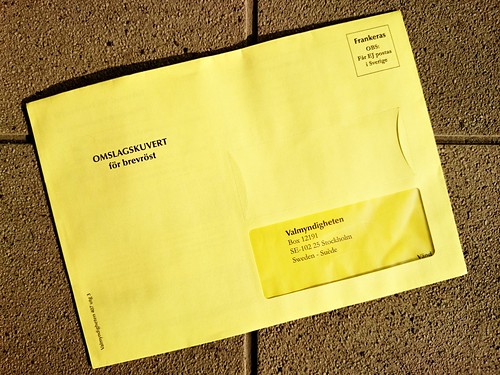It's time to vote for the EU parliament again. As I don't reside in Sweden I vote by post, and I've alredy cast my vote. What did I vote for? The Swedish Pirate Party.
The EU parliament is a bit different from national parliaments. Most regular political questions are not decided there. Pensions, welfare, medical care, defence, immigration, schools and so on are all decided at a national level; the EU simply doesn't have much or anything to do with such things. Whatever your views on any of it, this election does not affect it.
What they do decide on tend to be big, EU-wide questions or the transnational aspects of national issues, especially when it affects the fundamental rights of EU citizens. Take movement within the union for instance, where the EU assures your right to move freely as a member, but doesn't regulate the national rules for work benefits, certifications or work eligibility limits, as long as the rules aren't discriminatory.
As your national politics don't map onto the EU level, there's little point in casting a protest vote or use it to show national party support. National parties aren't really affected by this vote, and their positions on national issues may not say a lot on their policy for different EU-wide questions. So just as it can make perfect sense to split your vote in local elections, it can make a lot of sense at the EU level as well.
So, why the Pirate Party? One of the major responsibilities of the EU are our fundamental rights as citizens and as humans. Traditionally that has included rights to speak or to publish, congregate and unionize, the right to travel, the right to privacy, and ethnic and gender equality. You could arguably add things like a level economic and legal playing field to the list as well.
But these rights are all increasingly exercised through the internet. The net is becoming the printing press, the town square, the trading market, the meeting hall, the library — and yes, both the quiet coffee-shop corner booth and shady alley, as well as the microphone in the wall, the concealed tele-lens and the secret registers and dossiers.
The future of the net is the future of our fundamental rights as individuals. And as events the past few years have shown us, that future is currently under sustained, serious attack. Safeguarding that future is far too important to leave to private companies, lobbyists and unelected security organizations. None of them have any interest in safeguarding these rights, and every reason to pervert or erase them. What use is your right to speak today if the net will refuse to carry your words?
The net is truly international, to a greater degree than any other system we've ever created. It's too big and too diffuse for any national organization to regulate or safeguard. This is exactly where a transnational body such as the EU can really make an important and long-lasting difference for the better.
And despite all missteps, they often do; just two months ago the parliament voted through a data protection reform that greatly limits how and when personal data can be collected by others. And they did it because parliament members from parties such as the Pirate Party worked long and hard to make it happen.
Which is why I choose to vote for the Pirate Party. The net is vital for our fundamental rights as citizens in the EU, and the Pirate Party is working to safeguard it. If the net is important to you too, then you may want to vote the same way.


No comments:
Post a Comment
Comment away. Be nice. I no longer allow anonymous posts to reduce the spam.